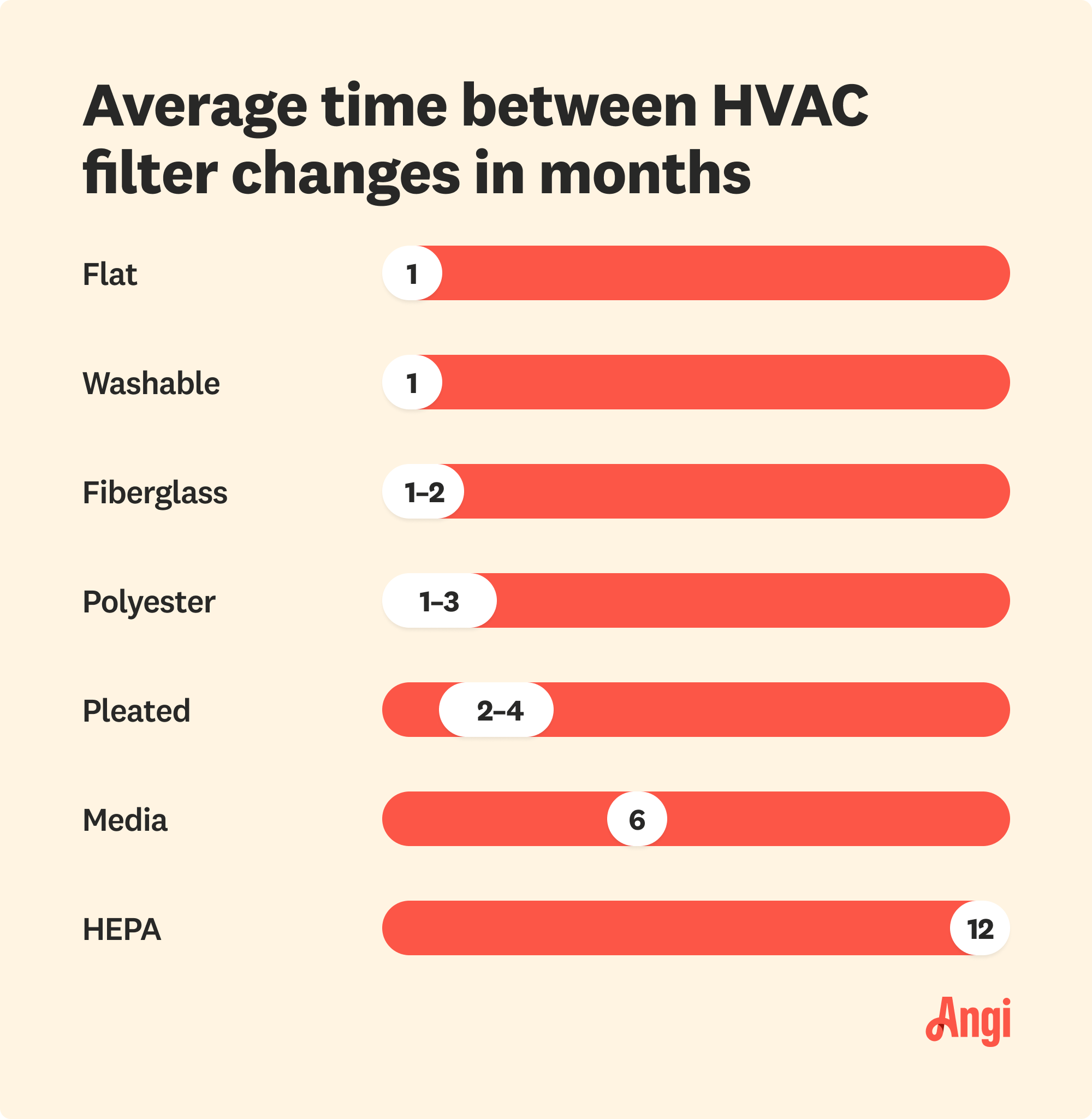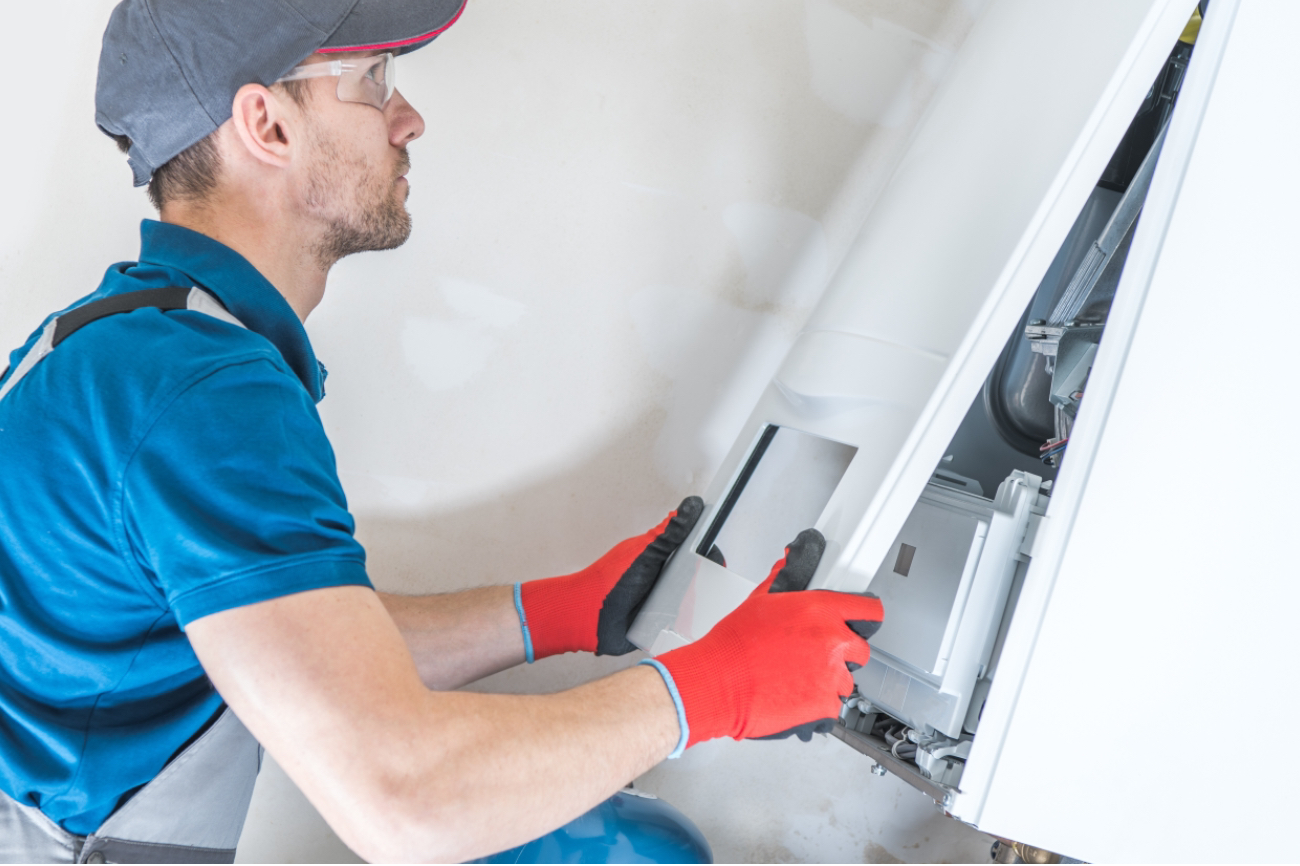
Heating and cooling system on the fritz? Discover the factors that go into HVAC repair costs and how you can save money on this crucial home update.
Heating and air conditioning service costs depend on your project and location. Check with a local pro for your specific job.
Replacing your HVAC filter is an affordable DIY that starts at just $10 on average.
You should change your filter every 90 days to keep your HVAC system in tip-top condition.
Flat filters start at $5, while higher-quality pleated or HEPA filters start at $20.
Thicker filters are more expensive, but also more efficient, meaning better ROI in the long run.
On average, you can expect to pay $20 to replace your HVAC filter, with costs commonly ranging from $10 to $50 or even more. Replacing your HVAC filter is the simplest yet most effective way to keep your HVAC system healthy and working properly. Doing so can potentially save you thousands, so let’s dive into the cost details of this important maintenance task.
The cost to replace an HVAC filter will vary based on several factors including size, thickness, MERV rating, and more. Let’s take a closer look at how each one will affect your final price.
There are several types of HVAC filters you can choose from, each varying in price. Disposable, flat, and pleated filters, the most common types, typically cost anywhere from $10 to $50. Flat filters are the lowest in price, which only cost around $5 for a pack of two. For higher quality filters, such as washable and HEPA filters, expect to pay more.
| Filter Type | Cost Range |
|---|---|
| Flat | $5–$10 |
| Pleated | $20–$50 |
| Washable | $30–$50 |
| HEPA | $20–$100 |
HVAC filter thickness ranges from one to five inches. The thickness of a filter also affects how much you pay for it. The standard disposable filter is 1 inch and usually the cheapest option. The thicker the filter, the better job it does at filtering out debris and other contaminants. While thicker filters tend to cost more, they also don’t need to be replaced as often.
The reason thicker filters generally cost more than thinner ones is because they have greater efficiency, also known as a MERV rating. Minimum Efficiency Reporting Values, or MERVs, reflect a filter’s ability to catch particles between 0.3 and 10 microns. MERV ratings range from 1 to 20, with higher values indicating that the filter is better at capturing specific types of particles.
Simply put, the higher the MERV rating for an air filter, the more you’ll pay. Filters with a MERV rating of 1 to 7 typically cost between $5 and $20. Filters with ratings of 8 to 13 can cost anywhere from $20 to $150. HVAC systems in residential homes usually don’t need (and often cannot handle) filters with a MERV rating of more than 13. It’s important to make sure that your home’s system can handle the MERV rating you choose.
This also goes for FPR and MPR ratings. Both of these systems measure filtration performance similarly to MERV. Higher FPR and MPR numbers equate to better performance and more expensive filters. Often, you’ll find MERV ratings listed beside MPR or FPR on a pack of HVAC filters, so the price difference is the same ($20 to $150 for higher ratings, $5 to $20 for lower ratings).
Filters come in several different lengths and widths to match the size of your HVAC system. Larger systems will require larger filters, which also will cost more. Here are the cost ranges for some common filter sizes.
| Filter Size | Cost per Filter |
|---|---|
| 20-by-20-by-1 in. | $5–$20 |
| 14-by-18-by-1 in. | $5–$20 |
| 20-by-25-by-2 in. | $10–$30 |
| 16-by-25-by-4 in. | $20–$60 |
| 16-by-25-by-5 in. | $20–$60 |

In most cases, replacing an HVAC filter won’t come with a long list of expenses. It’s usually as simple as buying a replacement filter, removing your old one, and installing the new one. However, if you discover that your HVAC system isn’t working properly, this may result in unexpected costs. Here are some additional costs to be prepared for.
In the process of replacing your HVAC filter, you may find out that your HVAC system is in need of some repairs. Maybe there’s an issue with your ignitor, thermostat, or another part. Whatever the issue, you can usually expect HVAC repairs to cost between $130 to $2,000, with the average cost being $350.
In the worst-case scenario, your entire HVAC system could need to be replaced. This can be quite costly, as HVAC replacement costs anywhere between $5,000 and $12,500. While this can seem like a significant amount, replacement may be the cost-effective choice if your old system is nearing the end of its lifespan or repair costs are more than 50% of the cost to replace.
There are advantages to trusting the pros with your HVAC filter requirements, especially if it’s a new system. Hiring a local AC repair pro ensures fast, high-quality results so your HVAC system runs smoothly.
Hiring heating and cooling pros for filter replacements has several benefits, including:
You can arrange for quarterly filter maintenance so you don’t have to worry about when to replace your filters.
Professionals can instruct you on the right size filter, how to access it, and which direction it should face.
The pros can inspect for additional problems with your HVAC and fan system while they handle the filter replacements.
Most homeowners can handle an HVAC filter replacement if they need to. Follow these guidelines for a successful replacement:
Access to your old filter is close to your fan system, often located at an indoor unit for your heating or cooling system.
Before you take the old filter out, pay close attention to its dimensions and the direction it’s pointing, which is very important for proper filtration. Most filters have dimensions printed on them and arrow marks for direction (arrows should follow the airflow).
When in doubt, inspect your fan system for labels or marker notations, which may indicate the type of filter you need.
Regularly changing your HVAC filter is one of the easiest and most inexpensive ways to save money in the long run. Taking good care of your HVAC system keeps it clean and maximizes its lifespan, which can help you avoid costly repairs or having to replace your system altogether.
Even still, there are ways to save on HVAC filter replacement costs. One way is to consider investing in a reusable filter rather than disposable ones that need to be replaced every few months. While a reusable filter costs more upfront, you’ll likely save money on a long-term basis by not having to change the filter so often.
Most homeowners can DIY changing an HVAC filter:
Turn off the system at the thermostat
Locate the filter compartment, which is typically near the furnace or behind a return air vent
Open the compartment and remove the old filter.
Insert the new filter, ensuring a snug fit
Close the compartment
Turn the HVAC system on
Make sure the new filter is correctly sized for your system. If you aren’t sure, pop open the compartment and measure the current filter. There’s also the matter of airflow direction. Look for arrows along the filter's exterior and ensure they point toward the unit once installed.
Home is the most important place on earth, which is why Angi has helped more than 150 million homeowners transform their houses into homes they adore. To help homeowners with their next project, Angi provides readers with the most accurate cost data and upholds strict editorial standards. We extensively research project costs to develop the pricing data you see, so you can make the best decisions for you and your home. We rely on reputable sources, including the U.S. Bureau of Labor Statistics, academic journals, market studies, and interviews with industry experts—all to ensure our prices reflect real-world projects.
Want to help us improve our cost data? Send us a recent project quote to [email protected]. Quotes and personal information will not be shared publicly.
From average costs to expert advice, get all the answers you need to get your job done.

Heating and cooling system on the fritz? Discover the factors that go into HVAC repair costs and how you can save money on this crucial home update.

Factors such as labor and parts impact the final price of repairing a window AC unit. Learn all of the costs associated with window air conditioner repair.

The cost of boiler repair depends on the specific issue. Read our expert guide, which breaks down boiler service costs so you can budget accordingly.

Having dirty evaporator and condenser coils works your HVAC system harder than it needs to. Here’s how to clean your air conditioner coils like a pro.

Discover heat exchanger replacement costs to learn about price factors, labor, and ways to save before hiring a pro or starting your project.

You’ll need to get creative if you want to run your portable AC in a windowless room. Here’s how to vent a portable air conditioner without a window.